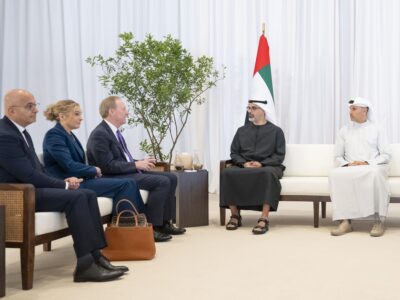Facebook, Orkut, MySpace, Hi5. All successful social networking sites. All in English. Enter the new kid on the block, the six month old www.d1g.com. Not another social networking site you cry? Oh yes, but its founders say they are taking the networking phenomenon one step further, not just by setting the default language to Arabic, but in the tools and the type of advertising they offer.
While many will roll their eyes at the thought of yet another social networking site – that they are a waste of employee time or even are a pointless activity – they in fact bring in big bucks. For example, last year Yahoo looked to acquire Facebook with the bidding reaching a massive US$1bn, while in August 2006 Google signed a US$900m deal to add its search engine facility and advertising onto MySpace. And the value and success of Facebook is the reason why the so-called founder, Mark Zuckerberg, and his old college friends are currently battling it out in the US courts over the rights to the website.
d1g, however, is the Middle East’s answer to the web 2.0 craze. The founders claim that the website is the fastest growing Arabic community on the web. Still only six months old, it boasts 150,000 registered users and two million visitors.
The CEO of d1g, Majied Qasem, admits he based the site on Facebook, but is keen to list the differences. “d1g is different to the likes of Facebook and Orkut and I would like to think we have a different perspective to those sites. The main difference is that the Middle East has different communities and needs. Online social networking is not a case of one size fits all. While the other sites cater to the needs of the population of America, Europe and many of the Western educated people in this part of the world, as these sites grow in complexity, language begins to become a barrier.”
We saw a 100% increase of users from Thailand following the ban of YouTube.
While MySpace and its contemporaries are typically Western, d1g is typically Middle Eastern, even the name. d1g is internet lingo for “deewanji, from the Arabic word ‘dewan'” a term used to describe a place where Arabic communities come together to converse, share information and chat to each other. Qasem finds no confusion over the internet-speak “Older people tend to miss the meaning of d1g but ask the younger generation, who have internet and text language entrenched in their language, and they get it straight away,” he says.
Other than offering online networking solutions in Arabic, the site offers a number of “new” tools. Following the acquisition of seenandjeem.com, the first Arabic questions and answers service portal in the region, the site offers a Q&A service as well as a video clip sharing facility and a comic sharing portal, among others. Qasem says, “Even the classical services are a little different, for example, with the chat facility, if users have a microphone and a video they can integrate those so they can see the person they are speaking to.”
“We have not simply changed the language and layout, it’s the way we are integrating the services we offer. For example, we put an emphasis on family life and mobility.” Last month the company bought Saudi-based website www.66g.com, which provides games, MP3 downloads, films and other content for mobile phones. Taking things one step further is the name of the game with d1g, and the acquisition will help “offer users a range of rich mobile services,” says Qasem. “We are looking to develop the online/offline application of the website so you don’t have to leave home without it. We are taking the concept of social networking and making it more generic,” he adds.
Users of the site are predominately Arabic youths between 14-24 years of age but the website is also available in English. While many English speaking internet users will stick to the websites with defaults set in English, people from non-Arab speaking countries also subscribe. The site has a sizable following in Thailand following YouTube being banned in the Kingdom. Qasem says: “We saw a 100% increase of users from Thailand following the ban. At least that shows we are doing something right,” he explains grinning.
Advertising is the obvious way to generate money through social networking sites, but Qasem, ever keen to develop ideas one-step further has introduced a different kind of advertising, namely TV commercials. Rather than the traditional form of online banner advertising, d1g offers companies the opportunity to jump on board and show TVC’s. “Advertising is an important aspect of our service. The price of online banner style advertising is diminishing. For example, five to seven years ago, the online advertising revenue used to be US$1m for a series of 1000 banners at around US$30 to US$40 each, now, we are lucky if we get US$15 to US$20, but the revenues are US$80m and are continuing to grow.”
“Video is another medium for online advertising and because it is different, it is not as intrusive as pop-up advertising. Our video adverts are played before an uploaded video or clip is played. The advert doesn’t need uploading so it’s played quickly and only lasts for five seconds so it’s not intrusive. You will never find yourself in a position where you end up watching five adverts in a row though.”
“With the adverts of d1g and video advertising, we are able to provide advertisers with a new digital outlet for their ads. This service is a new and effective medium,” Qasem continues.
The site now shows two million clips per month and already has big names such as Coca Cola and Snickers on board. “Coke has already tried it and loved it. Having a strategically significant advertiser like them participating in the program clearly demonstrates the high value of our advertising strategies. We are also currently piloting the scheme with other brands.”
d1g was only launched in February of this year but the site is already making money, however Qasem won’t say how much. “I can’t disclose exactly how much but we are aiming to break even towards the end of this year. This means it will have taken us only 10 months – February to December – which I think, in this industry is almost record time,” he boasts.
Controlling online content is always an issue, particularly in this region, which has seen the recent ban of Orkut following a number of complaints to the Telecommunications Regulatory Authority (TRA) about inappropriate material found on the site. Screening inappropriate material is a topic of debate at d1g but Qasem believes a certain amount of control is necessary. “Culturally we believe a bit of control and responsibility is required. Even when we do exercise control over content, it’s not out of fear of certain governments, it’s because we have a responsibility. Our team sees everything that is published. They look at the comments and all of the uploaded material to ensure that nothing obscene or politically devastating or violent is on the site.”
If something is deemed inappropriate, a member of the team personally calls the user and explains why the material has been taken off. “We go through so many layers, as the material is often very subjective. We talk to a lot of our customers over the telephone in order to offer a more personal service. To maintain this approach we are exploring models to see how we can outsource services like call-centres so people can phone if they have an issue.”
“We want to educate our users. The ability to share everything you want with the world is still relatively new to this region. That kind of responsibility – and it is a responsibility – is something that people don’t necessarily know how to deal with. By picking up the phone we offer a more personal service.”
Qasem is no stranger to the world of online technology. After being educated in the US, he says his return to the region couldn’t have been at a better time for his career. “I made a decision in 1994 to come back to the Middle East and make it happen. When I returned there was a migration of skills coming from this part of the world moving outside, as well as a gap in enthusiasm and skills. A series of opportunities presented themselves, some of which I took advantage of and leveraged responsibly well. It was also a combination of luck.” Those opportunities include the launch of www.arabia.com, the leading Arabic online portal at the time. Qasem then founded ONEWORLD solutions, a profit centre servicing the Middle East, catering to regional organisations such as the government of Qatar, MobileCom and Savola. Under Qasem, ONEWORLD solutions grew from a company of two to more than 200 people in five offices around the world with annual revenues of US$13m.
Qasem then became managing director for the Jordan Education Initiative (JEI), which focused on creating a replica model of education reform through public private partnerships and his work with the government of Jordan. He then noticed a gap in the market for Arab youths on the internet. “The chairman of d1g, Rudain Kawar, approached me and said he wanted to do something with the space.” The concept was agreed in May 2006, the site launched six months later and now has a team of 36.
Filling the gap in the market is Qasem’s motivation behind the site and like many of his business ventures, he claims much of it is due to being in the right place at the right time. “Right now the region is growing at an incredible rate… and the number of Arab youths jumping online is growing phenomenally. The likes of Facebook can only take them so far.”
“The other aspect is the advertising. The Middle East is still below the global threshold, so while the online advertising is growing globally at 2%, for the past five years, this region has averaged more than a 20% growth and is expected to grow even more. There is a need for the correct service to be provided for advertisers as well as the sites users. It was the right time.”
Culturally we believe a little bit of control and responsibility is required.
With more members joining on a daily basis and more tools being introduced for both advertisers and users, momentum is gaining for the site but will it gain a Facebook-like status?
“I don’t think the users of Facebook are the same users of d1g… We are far from being the 30 million people on Facebook but we’ve only been live for six months and I think to achieve this much in such a short space of time is amazing.”
The future of d1g is growing and not just in membership. Despite being late in launching due to technical difficulties, Qasem says he is bringing out a new Arabic search engine very soon. “This will be the second Arabic search engine but we feel we are offering something fundamentally different. Given that a lot of online content is user generated, the engine will take both the internet lingo and cultural meaning of words into consideration.”
Building on what is already available, learning from other people’s mistakes and making them work all combine to form Qasem’s work ethic.
Watch out Facebook!
It is estimated that pharmaceutical companies spend on average 32% of their marketing budget advertising on social networking sites.
8.5 million photos are uploaded daily on Facebook.
Facebook has more than 30 million members worldwide and generated an estimated US$50m last year.
Orkut, the brainchild of Turkish software engineer, Orkut Büyükkökten, has over 62m members and was developed as part of an individual project for Google in 2002.
The first social networking website was www.classmates.com which launched in 1995.
The latest web 2.0 site is the business orientated LinkedIn, aimed at professional networking. Last month the site claimed it had more than 12 million registered users, spanning 150 industries and more than 400 economic regions.







